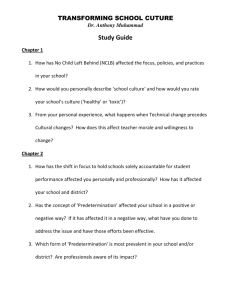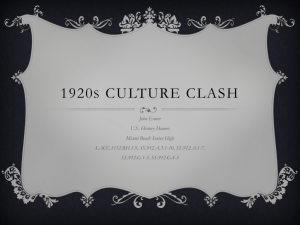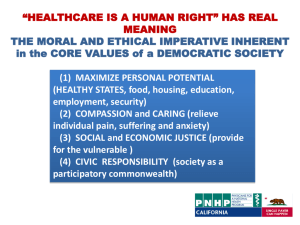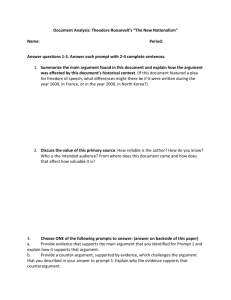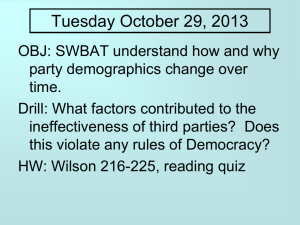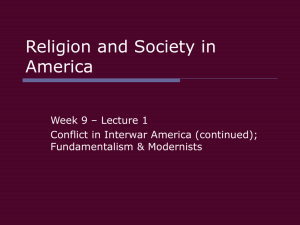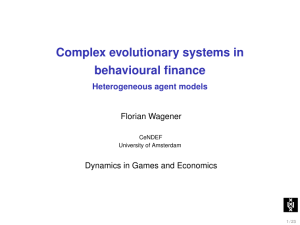AP US HISTORY FREE-RESPONSE QUESTIONS UNITED STATES
advertisement
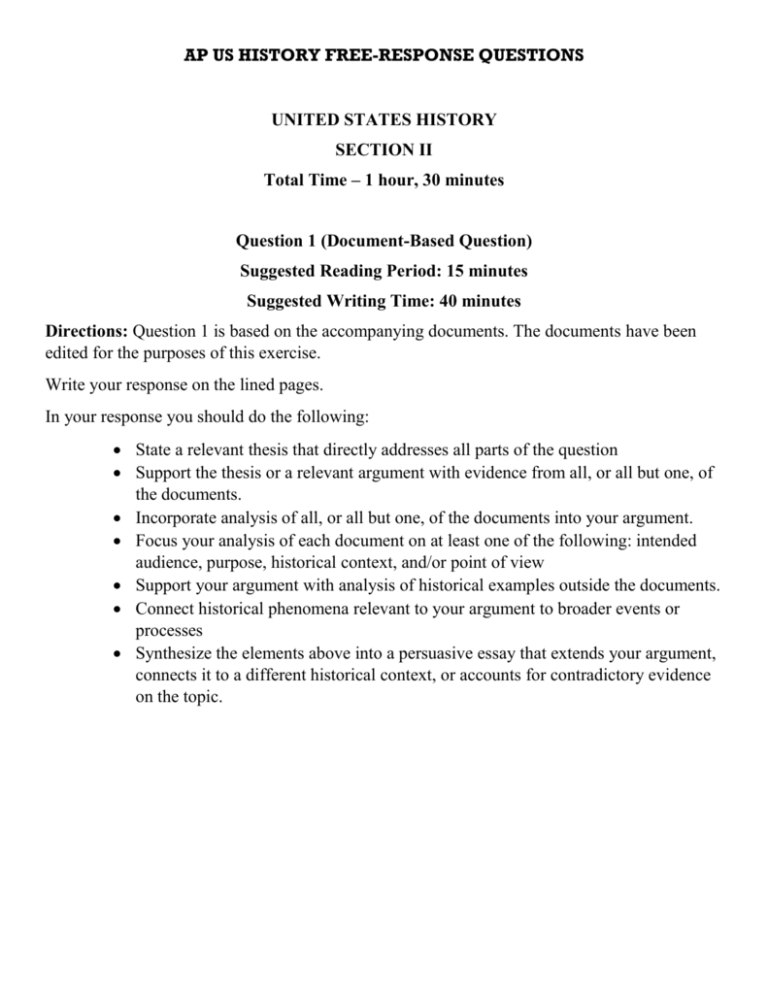
AP US HISTORY FREE-RESPONSE QUESTIONS UNITED STATES HISTORY SECTION II Total Time – 1 hour, 30 minutes Question 1 (Document-Based Question) Suggested Reading Period: 15 minutes Suggested Writing Time: 40 minutes Directions: Question 1 is based on the accompanying documents. The documents have been edited for the purposes of this exercise. Write your response on the lined pages. In your response you should do the following: State a relevant thesis that directly addresses all parts of the question Support the thesis or a relevant argument with evidence from all, or all but one, of the documents. Incorporate analysis of all, or all but one, of the documents into your argument. Focus your analysis of each document on at least one of the following: intended audience, purpose, historical context, and/or point of view Support your argument with analysis of historical examples outside the documents. Connect historical phenomena relevant to your argument to broader events or processes Synthesize the elements above into a persuasive essay that extends your argument, connects it to a different historical context, or accounts for contradictory evidence on the topic. Document A: "If it had not been for these things, I might have lived out my life talking at street corners to scorning men. I might have died unmarked, unknown, a failure. Now we are not a failure. This is our career and our triumph. Never in our full life could we hope to do such work for tolerance, for justice, for man's understanding of man as now we do by accident. Our words--our lives--our pains--nothing! The taking of our lives--lives of a good shoemaker and a poor fish-peddler--all! That last moment belongs to us--that agony is our triumph." Statement attributed to Bartolomeo Vanzetti by Philip D. Stong, a reporter for the North American Newspaper Alliance who visited Vanzetti in prison in May of 1927 shortly before he and Sacco were executed. Document B: Document C: AN ACT prohibiting the teaching of the Evolution Theory in all the Universities, Normals and all other public schools of Tennessee, which are supported in whole or in part by the public school funds of the State, and to provide penalties for the violations thereof. Section 1. Be it enacted by the General Assembly of the State of Tennessee, That it shall be unlawful for any teacher in any of the Universities, Normals and all other public schools of the State which are supported in whole or in part by the public school funds of the State, to teach any theory that denies the story of the Divine Creation of man as taught in the Bible, and to teach instead that man has descended from a lower order of animals. The Butler Law, PUBLIC ACTS OF THE STATE OF TENNESSEE PASSED BY THE SIXTY-FOURTH GENERAL ASSEMBLY, 1925 Document D: “It seems to me the point as to this measure—and I have been so impressed for several years—is that the time has arrived when we should shut the door. We have been called the melting pot of the world. We had an experience just a few years ago, during the great World War, when it looked as though we had allowed influences to enter our borders that were about to melt the pot in place of us being the melting pot. I think that we have sufficient stock in America now for us to shut the door, Americanize what we have, and save the resources of America for the natural increase of our population. . . we shall shut the door—which I unqualifiedly and unreservedly believe to be our duty—and develop what we have, assimilate and digest what we have into pure Americans, with American aspirations, and thoroughly familiar with the love of American institutions, rather than the importation of any number of men from other countries. If we may not have that, then I am in favor of putting the quota down to the lowest possible point, with every selective element in it that may be. ” Speech by Ellison DuRant Smith, April 9, 1924, Congressional Record, 68th Congress, 1st Session (Washington DC: Government Printing Office, 1924), vol. 65, 5961–5962 Document E: “Already all of us must have heard about the people who call themselves the Fundamentalists. Their apparent intention is to drive out of the evangelical churches men and women of liberal opinions. I speak of them the more freely because there are no two denominations more affected by them than the Baptist and the Presbyterian. We should not identify the Fundamentalists with the conservatives. All Fundamentalists are conservatives, but not all conservatives are Fundamentalists. The best conservatives can often give lessons to the liberals in true liberality of spirit, but the Fundamentalist program is essentially illiberal and intolerant. The Fundamentalists see, and they see truly, that in this last generation there have been strange new movements in Christian thought. A great mass of new knowledge has come into man’s possession—new knowledge about the physical universe, its origin, its forces, its laws; new knowledge about human history and in particular about the ways in which the ancient peoples used to think in matters of religion and the methods by which they phrased and explained their spiritual experiences; and new knowledge, also, about other religions and the strangely similar ways in which men’s faiths and religious practices have developed everywhere.” Source: Harry Emerson Fosdick, “Shall the Fundamentalists Win?” Christian Work 102 (June 10, 1922): 716– 722. Document F: Look about you. The theatre, the magazine, the current fiction, the ballroom, the night clubs and the joyrides—all give evidence of an ever-increasing disregard for even the rudiments of decency in dress, deportment, conventions [standards], and conduct. Little by little the bars have been lowered, leaving out the few influences that held society in restraint. One need be neither prude nor puritan to feel that something is passing in the hearts and in the minds of the women of today that is leaving them cold and unwomanly. . . . We may try to deceive ourselves and close our eyes to the prevailing flapper conduct. We may call boldness greater self-reliance, brazenness greater self-assertion, license greater freedom, and try to pardon immodesty in dress by calling it style and fashion, but the fact remains that deep down in our hearts we feel a sense of shame and pity. Rev. Hugh L. McMenamin [Roman Catholic priest], “Evils of Woman’s Revolt against the Old Standards”, Current History, October 1927 Document G: I am fed up With Jim Crow laws, People who are cruel And afraid, Who lynch and run, Who are scared of me And me of them. I pick up my life And take it away On a one-way ticket Gone Up North Gone Out West Gone! Langston Hughes, 1926 Document H: Popular Science Monthly, March 1926 Document I: The Klan marching on Washington, proclaiming that all Catholics, Jews, Negroes, and recent immigrants are not true Americans, and are a problem to be confronted by the nation. The Klan's Imperial Wizard, Hiram Wesley Evens, stated "We will not permit him (the Negro) to gain sufficient power to control our civilization. Neither will we delude him with promises of social equality which we know can never be realized.” The North American Review, 1926 Document J: "The evils of booze", Ohio prohibition campaign cartoon.
